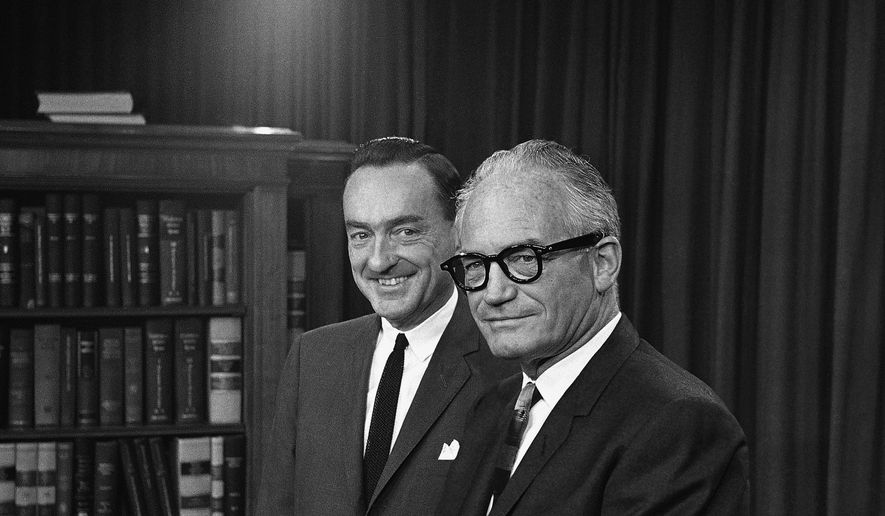OPINION:
Back in 1964, “conservative” was a dirty word in New York Republican circles. The party was under the thumb of the original RINO (Republican in name only) Gov. Nelson A. Rockefeller, who believed he was destined to be elected president in 1964.
To achieve that end, Rockefeller made it clear that he would control the New York delegation to the convention and that no opposition would be tolerated. There was, however, one fly in the GOP ointment: the newly created Conservative Party of New York.
Founded in 1962 by J. Daniel Mahoney and his brother-in-law, Kieran O’Doherty, the Conservative Party’s purpose was to counter the Rockefeller domination of New York’s Republican organization and to serve political ideals first.
Mahoney, O’Doherty and a band of principled people went door to door in 1961 to collect tens of thousand of signatures on petitions required by law to establish a new party. And despite an army of highly paid Rockefeller lawyers charged with the task of stopping them, the party withstood court challenges and made its debut on the 1962 ballot.
Rockefeller, striving for a huge re-election victory that year to bolster his presidential ambitions, was disappointed by the results. His little-known Conservative Party opponent, David Jaquith, racked up an astonishing 141,877 votes. Political pundits agreed that Jaquith’s candidacy was responsible for tarnishing “Rocky”’s vote-getting ability, and that his presidential juggernaut had hit a bump in the road — if not a brick wall.
In 1964, Conservative Party members had no intention of sitting on the sidelines and became activists in the Goldwater movement. Their first move was to participate in the National Goldwater Rally, scheduled to be held on May 12, 1964, at 8 p.m. in Madison Square Garden. A strong showing in Rockefeller’s backyard would send a strong message of hope to conservative Republicans throughout New York.
As a 24-year-old gung-ho Goldwater supporter, I paid $2 for my ticket and made sure I got there when the Garden doors opened at 6:30 p.m. Coming out of the subway station, I was shocked to see the size of the crowd lined up to attend the rally. Tickets to fill the 18,000-seat Garden were sold out, and another 15,000 stood outside to greet Goldwater and to listen to speeches via loudspeakers on 50th Street and 8th Avenue.
That jampacked rally was one of the great experiences of my lifetime. It got my adrenaline cooking, and my voice became hoarse from all the cheering.
A “National Goldwater Rally Song Sheet” was handed out that contained the text of a tune titled “Go with Goldwater.” The entire assembly shouted “Go with Goldwater! You know where Goldwater stands. Clap your hands. Let’s go with Goldwater’s plans. Clap your hands and go with Goldwater. Barry’s the man for our land!”
William F. Buckley Jr. and several other prominent conservatives delivered warm-up speeches, and when Goldwater entered the arena, the crowd went crazy. The rally was a triumph for Goldwater and inspired me to go out and do battle in the capital of American liberalism — New York City.
To further aid Goldwater, Conservative Party leaders put out a report exposing Rockefeller’s fiscal performance as a “fraud on the voters of N.Y. and the nation” and published a 20-page “how to” manual for Republicans prepared to enter the June 2 GOP primary as Goldwater delegates. Ten slates qualified, and there were Goldwater victories in Erie, Nassau and Queens counties.
In the fall election, the Conservative Party took the lead in promoting Goldwater after word went out that the state GOP was not to lift a finger for its presidential nominee. People like me, who were energized at the Goldwater rally, manned hundreds of campaign storefronts throughout the state and distributed tens of thousands of paperback copies of Goldwater’s “Conscience of a Conservative” and John Stormer’s “None Dare Call It Treason.”
Although Goldwater lost New York by nearly 3 million votes on Election Day, he had a lasting impact on the state’s fledging conservative movement. Goldwater volunteers joined a cause that one year later garnered 341,000 votes for Buckley, the Conservative Party’s New York City mayoral candidate, and in 1970 helped deliver the 2.4 million votes that elected the party’s standard-bearer, James L. Buckley, to the U.S. Senate.
Those successes permitted Goldwater’s heir, Ronald Reagan, to proclaim that the Conservative Party had “established itself as a preeminent force in New York politics and an important part of our political history.”
• Michael R. Long is state chairman of the Conservative Party of New York State.




Please read our comment policy before commenting.